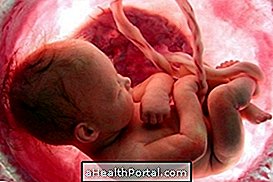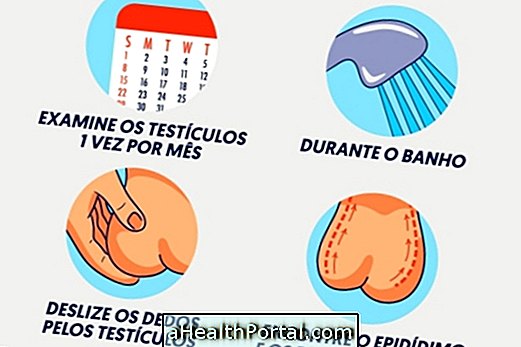The first signs and symptoms of pregnancy can occur before the delay of menstruation, but they can be so subtle that only women who are very alert to your body or are trying to get pregnant may realize, because for most women, they may go unnoticed. The first symptoms to watch out for are:
- Pink vaginal discharge;
- Colic and abdominal bloating;
- Sensitive and swollen breasts;
- Easy fatigue;
- Aversion to strong odors;
- Humor variations;
- Nausea, vomiting or excessive salivation;
- Dizziness, sleepiness and headache;
- Increased urge to urinate;
- Pimples and oily skin.
However, these symptoms should be taken into consideration, especially after menstrual delay, because they can also be confused with PMS.
Test to know if you may be pregnant
- 1
- 2
- 3
- 4
- 5
- 6
- 7
- 8
- 9
- 10
Find out if you are pregnant
Start the test


- Yes
- Not

- Yes
- Not

- Yes
- Not

- Yes
- Not

- Yes
- Not

- Yes
- Not

- Yes
- Not

- Yes
- Not

- Yes
- Not

- Yes
- Not
Regardless of the outcome of this test, the best way to confirm that you are pregnant is by taking a home pregnancy test from the pharmacy, which can be done from the 1st day of menstrual delay or after 14 days of intercourse within the period fertile.
Symptoms of pregnancy in the first 7 days

The typical symptoms of the first days of pregnancy are the most difficult to identify and are usually more easily identified by women who can identify very subtle differences in the body itself:
1. Pink vaginal discharge
When the egg is fertilized, there may be a slight pink discharge, which is actually the normal discharge that the woman presents (excess of vaginal mucus) with traces of blood caused by the spermatozoid entering the egg and its displacement until the uterus. This discharge may appear a few minutes after intercourse or up to 3 days after intimate contact, the life span of the sperm within the female organism. Sometimes this discharge is only observed when the woman will cleanse herself after urinating.
2. Colic and abdominal bloating
With the fertilized ovum, there is an increase in blood flow in the pelvic region, and then the female hormones take action to preserve the embryo and continue the pregnancy and this may cause some abdominal discomfort that can be recognized as being a menstrual cramp of low to medium intensity. In addition, the woman may still have a small loss of blood, similar to menstruation, but in lesser amount.
Abdominal swelling is also one of the first symptoms of pregnancy and it is also caused by the intense pelvic changes that are happening, arising more often in the first 7 days to 2 weeks. Increased blood flow and adaptation to uterine growth are the major cause of this slight abdominal swelling, which for some may go unnoticed. Around 7 weeks of gestation the lower part of the navel begins to get hard.
Symptoms of pregnancy in the first 2 weeks

Symptoms that begin around the second week are some of the most typical of pregnancy and can last for several weeks:
3. Sensitive and swollen breasts
In the first two weeks of pregnancy, the woman can observe that the breasts become more sensitive and this is due to the action of the hormones that stimulate the mammary glands preparing the woman for breastfeeding. Thus, there is also an increase in breast volume, which begins to have more developed mammary glands to support the baby's needs after birth.
In addition, the nipples may also undergo some changes, becoming more tender and swollen, and the areola may become darker than normal by increased blood flow in the region. Some women may even feel very uncomfortable with the simple brushing of the blouse or bra on the nipple.
4. Easy tiredness
Tiredness is one of the most common symptoms of pregnancy that may be present throughout pregnancy, starting around the second week. It is normal for this tiredness to increase during the first 12 weeks of pregnancy, while the body adapts all its metabolism to provide the energy necessary for the development of the baby.
This type of tiredness is easily identifiable when the woman begins to feel that the tasks she did previously are becoming too exhausting, arriving at the end of the day without energy or needing to sleep more than 10 hours a night to replenish the energy she spent.
5. Aversion to strong odors
It is very common that early in pregnancy the woman has aversion to strong odors, even if they are apparently pleasing, like perfume. Most pregnant women may even vomit after feeling a strong smell, such as gasoline, cigarette smoke or cleaning products, for example.
Also, because olfaction is altered, some women may also report that there is a change in the taste of food, which becomes more intense and cloying.
6. Mood Variations
In the first two weeks of pregnancy, the woman may notice some mood swings, with no apparent cause. It is very common for the pregnant woman to cry for situations that would not make her cry before she is pregnant and this symptom should remain throughout the pregnancy.
This is because the strong hormonal changes, normal pregnancy, can cause an imbalance in the levels of neurotransmitters, leaving the mood more unstable. Understand better why pregnant women become more sensitive.
Symptoms of pregnancy after 1 month

After the first month of gestation, in addition to the delay in menstruation, many women begin to have other characteristic symptoms, such as:
7. Nausea, vomiting and salivation
Nausea and vomiting are common, especially in the morning, and these are some of the most known pregnancy symptoms, which generally appear after the 6th week of gestation and can last through pregnancy. However, nausea does not always have to be accompanied by vomiting, and it is even more frequent that nausea appears and disappears without the woman vomiting, especially in the morning.
Associated with these symptoms, excessive salivation may also occur, which makes nausea even more uncomfortable for the woman. Thus, although excessive salivation can be maintained throughout gestation, it is often decreased when nausea improves.
8. Dizziness, sleepiness and headache
Dizziness and untimely sleep are pregnancy symptoms that occur because of low blood pressure, blood glucose lowering and poor diet due to frequent nausea and vomiting. They appear as early as the first 5 weeks of pregnancy but tend to decrease after the 20th week of gestation.
Headache is also common during pregnancy due to hormonal changes, but it is usually weak, although persistent and often the woman can not even associate this discomfort with pregnancy.
9. Increased urge to urinate
With the advancement of pregnancy, the body of the pregnant woman needs to produce several hormones, such as progesterone, to ensure that the baby develops in a healthy way. When this happens, the muscles of the bladder become more relaxed and therefore it is more difficult to completely empty the urine that is inside the bladder and, therefore, the woman may feel a more frequent urge to go to the bathroom to urinate.
10. Oily skin and pimples
Hormonal changes can lead to the onset or worsening of blackheads, called scientifically acne, and therefore, after the first month of pregnancy, the woman may notice an increase in skin oiliness, which can be controlled with the use of skin cleansers and personal hygiene products.
When to take the pregnancy test
The pregnancy test purchased at the pharmacy can be done on the first day of the menstrual period. If the result is negative, a further 3 to 5 days can be expected, and if menstruation continues late, a new pregnancy test can be performed. If the result is still negative, evaluate the possibility of having a blood test to diagnose the pregnancy because it is more reliable and shows the amount of the hormone Beta HCG, which is only produced during pregnancy. This test can indicate the Positive or Negative result and also how many weeks of gestation you are:
- 7 days after fertilization: up to 25 mIU / mL
- 4 weeks after the Last Menstruation Date: 1, 000 mIU / mL
- 5 weeks after Date of Last Menstruation: 3, 000 mIU / mL
- 6 weeks after the Date of Last Menstruation: 6, 000 mIU / mL
- 7 weeks after the Date of Last Menstruation: 20, 000 mIU / mL
- 8 to 10 weeks after the Date of Last Menstruation: 100, 000 mIU / mL
However, if the woman does not have to be pregnant after 10 days of delayed menstruation, she should make an appointment with a gynecologist to check the cause of the menstrual delay. Here are some possible causes for: Because menstruation delays.
Watch this video to find out what are the symptoms of early pregnancy that may go undetected for some women:

In case of psychological pregnancy all these symptoms may be present and the only way to prove that there is no developing fetus is through examinations. If your test was negative on 2 different days, you want too much or are too afraid of getting pregnant, these symptoms may be present. If this is your case, see how to identify and treat psychological pregnancy.
What to do if the result is positive
After confirmation of pregnancy through the urine test, it is advised to do a laboratory pregnancy test because this test indicates the amount of Beta HCG hormones present in the bloodstream and as soon as possible should arrange an appointment with a gynecologist or obstetrician to start monitoring the pregnancy. It is important to perform these 2 exams so the doctor can compare the results.
If your result was positive, congratulations! Now insert your data here to know when the baby should be born:

When to do the ultrasound
From 5 weeks of pregnancy the doctor can perform a transvaginal ultrasonography to observe the gestational sac and verify if the gestation is developing inside the uterus, because in some cases, ectopic pregnancy can occur, which is when despite the woman being pregnant the baby is developing in the fallopian tubes, which is very serious and puts a woman's life at risk.
If the doctor has not done ultrasound before, between 8 and 13 weeks of gestation should ask for this test to also confirm the gestational age and when the baby should complete 40 weeks, which should be the expected date of delivery.
In this exam the baby is still very small and little can be seen, but it is usually very exciting for parents. It is still too early to know the sex of the baby, but if the doctor suspects it is a boy, it is likely to be, but it still needs to be confirmed at the next ultrasound, in the second trimester of pregnancy, around 20 weeks.
























